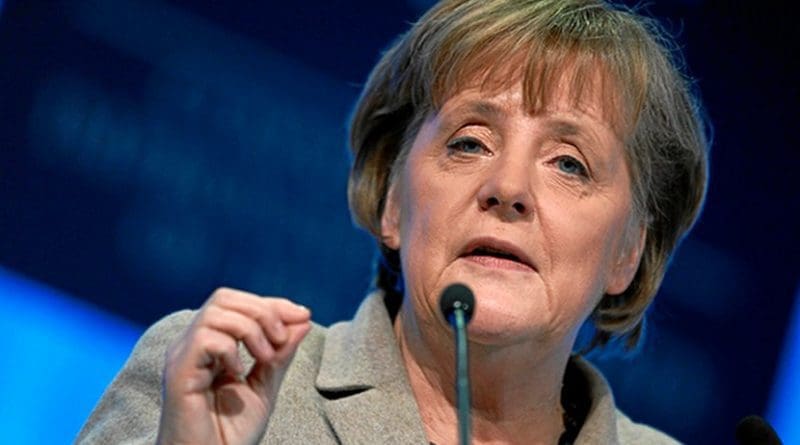Why Merkel Is The Right Choice For Europe’s Top Job – OpEd
By Arab News
By Ranvir S. Nayar*
After the drubbing they received during the elections to the European Parliament last month, the traditionally key parties of the EU, the socialists and the conservative democrats, face another uphill task in the next three months: Ensuring that the key position of European Commission president is not claimed by the far right.
A key position, the president of the commission is responsible for implementing the organization’s policies, formulating new European laws and representing the commission at key international forums, such as G7 meetings. The position is decided by the leaders of the EU member states from among the candidates proposed by the groups of parties in the European Commission.
Traditionally, Germany and France, the two heavyweights of the EU, play a key role in filling this position. However, this time there are strong differences between the two nations, mainly due to the less than warm relations between German Chancellor Angela Merkel and French President Emmanuel Macron. Germany has already proposed Manfred Weber, the candidate of the center-right parties in the Parliament, but his candidature has been opposed by several national leaders across Europe, notably Macron.
The composition of the newly elected Parliament is such that, on its own, no group is anywhere close to a majority and hence most of the bigger blocs may end up joining hands to ensure that their candidate gets through.
In the current scenario, where Macron and some other EU leaders have already rejected Weber, it is difficult to imagine another compromise candidate, with the exception that Merkel withdraws Weber and either accepts a candidate from another bloc or finds a candidate within the center-right European People’s Party to replace him. It is unlikely that any candidate that does not have the backing of Merkel would have a realistic chance of being given the post.
It is from this perspective that the proposed candidature of Merkel herself seems not only like a good option, but perhaps the choice that Europe needs to make at this juncture. Though she has not commented on the issue, even Macron has said he would support her for the top job. Merkel’s tenure as chancellor will end two years from now and, when she stepped down as the leader of her domestic party, the Christian Democratic Union (CDU), at the end of last year, she said she would quit politics after 2021.
Merkel would be likely to win hands down, not only because most European leaders are familiar with her and would prefer a strong, political face as president, rather than the little-known Weber, but also because a strong and well-known leader like Merkel is precisely what the EU needs at the head of the commission’s massive workforce of more than 30,000 officials, which has often been criticized as a “faceless, unelected bureaucracy.”
Besides being the best possible answer to such criticisms, Merkel is also the best-suited candidate, as she is the longest-serving head of government in the EU and is deeply familiar with Europe, its people, its challenges and the opportunities for the EU. Also, as the EU is deeply riven by differences and faces the strongest rise of the far-right since the Second World War, an able and bold leader like Merkel is needed to steady the ship.
Merkel could also set the direction for Europe, which seems to be lost and tentative, not just due to the rise of populism and the far right, but also Brexit and the increasing volume of anti-Brussels noises emanating from various EU member states. There are several dossiers that the EU needs to treat, post-Brexit. These include further expansion, as well as the creation of an integrated European defense force, closer collaboration between the various law enforcement agencies, migration, and facing up to the challenge and threats posed by China as a business rival and Russia as a security and strategic threat.
The EU also has to deal with US President Donald Trump’s unpredictable ways, especially vis-a-vis trade and Iran, where the two sides have strong differences of opinion. Merkel’s 15-year stewardship of Germany has definitely prepared her far better than any other EU leader to handle the numerous crises facing the bloc.
Besides making life easier for the Europeans, Merkel also has a more political reason to take on the top job in Brussels. If she steps down this October, it will give nearly two years in office to her successor, most likely to be Annegret Kramp-Karrenbauer, who took charge of the CDU last December. By getting nearly two years as chancellor before the next elections, AKK, as she is known, will be able to leave her own mark in the government and dilute, to some extent, the strong mark made by Merkel, whose popularity in the country has suffered since the migration crisis began almost five years ago. The chancellorship would also allow AKK to highlight her own priorities and implement her policies to revive the German economy and build greater cohesion in society.
If she succeeds in this, AKK could steer her party to yet another victory in October 2021 and reinforce Merkel’s legacy. The only stumbling block, besides a rejection of this position by Merkel herself, could be concerns over her health, as the chancellor has twice been seen shaking in public appearances recently; though that may be largely due to the record temperatures that Germany has been experiencing.
So there are several good reasons to convince Merkel to take the top job at the European Commission, but it remains to be seen if she will take the bait.
- Ranvir S. Nayar is the editor of Media India Group, a global platform based in Europe and India that encompasses publishing, communication and consultation services.

